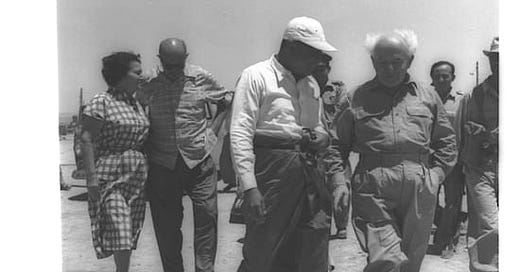The Israelization of Judaism?
A new book argues that Israel is the last vital node in Jewish life
On The Israeli Century
Yossi Shain, for years one of the leading academic writers on Israel-Diaspora relations and now a member of Israel’s Knesset, has just published a new work called The Israeli Century. It is a big book, written as a history of the Jews from antiquity to the present. But the historical matter is meant to resuscitate an old argument, which is as follows: The establishment of modern Israel, and its recent run of political and cultural success, demonstrates that Israel represents the fulfillment or telos of Judaism. And the rebirth of a vibrant state, and a more political Judaism, has rendered many of the modes of diaspora Judaism quaint, if not obsolete.
It is a provocative and important argument. While one hasn’t heard much of it in recent decades, it is also not exactly new. Shain’s argument about the withering of the diaspora was expressed at different times in the twentieth century by Zionist and Israeli figures, including the eminent David Ben-Gurion. And at the time when Diaspora Judaism seems to be weakening, and Israel seems to be growing stronger (despite many challenges), it is a thesis worth examining at the very least. I try to do to so in a long review at Tablet Magazine’s The Scroll. (Full disclosure: Shain is a former co-author and collaborator, so I’m hardly completely impartial when I praise his work as I do).
Read the whole thing for free here, and do consider signing up for this interesting daily newsletter edited by Jacob Siegel and Sean Cooper. Some excerpts:
The Question
In light of the changes of the balance of power between diaspora and Israeli Jews, does Ben-Gurion’s position deserve a second look? Is Israel not only the center of Jewish life but soon to be the only vital node in Jewish life? This is the argument advanced by Yossi Shain in his new book, The Israeli Century. Though he doesn’t quite follow Ben-Gurion and other Zionists of the last century all the way to “negation of the Diaspora,” Shain argues that Jewish history reached a certain culmination in the establishment of the State of Israel and its remarkable growth in strength and vitality since then. The Jewish future, argues Shain, is thus to be found in the State of Israel or at least conducted through it as the single vital node in Jewish life. The Jewish future will be based on Israeliness—with the Israeli way predominating over diaspora modes of Judaism, whether religious or secular.
What is Shain right about?
Is Judaism and Jewish life, then, in the process of Israelization? There is much that is accurate in Shain’s telling, even as many diaspora Jews would not like to hear it. It’s increasingly hard to get away from Israel if one wants to remain Jewishly engaged in the diaspora. The recent novel by Joshua Cohen, The Netanyahus, illustrates this point well. Cohen, who seems to aspire to be a literary chronicler of the American Jewish experience, in the book tries rather haplessly to characterize a typical Jewish intellectual of the mid-20th century. But to make the story interesting, he had to have recourse to an interesting cast of Israelis. Philip Roth, of course, also wrote novels about Israel and diaspora-Israel relations. But he also did and could write novels about interesting American Jews in their own milieu. There are novels written on this theme today. Are they any good?
Is Diaspora Judaism really done for? Is not Diaspora Judaism itself making a comeback—in Israel?
The limitation in the argument that Judaism is being Israelized is the fact that Israel itself is becoming more and more Jewish. And the Judaism of Israel is not simply a Bible and Hebraic culture-centric Judaism sought, at various moments, by David Ben-Gurion and other founders of Israel. Diaspora Judaism has struck back.
Guess Who’s Back? הוא חזר
What Ben-Gurion didn’t say: My ancestors studied the laws and the cosmos so I could practice and resuscitate the art of war.
(Photo: The Paul Goodman collection).
Coming up:
Reflections on “literary New York,” the growing remoteness of the classics of American political thought, and more.
Have a good week!



